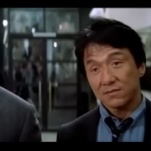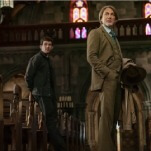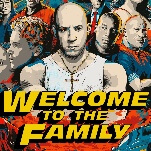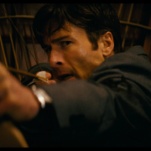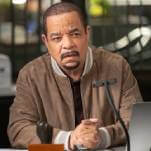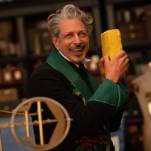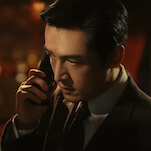In Podmass, The A.V. Club sifts through the ever-expanding world of podcasts and recommends 10–15 of the previous week’s best episodes. Have your own favorite? Let us know in the comments or at [email protected].
[Subscribe on iTunes]
The podcast ARRVLS is a show predicated on exploring change, examining those moments when individuals discover that the bedrock on which their lives were thought to be constructed turns out to be shifting sands, doing so with a great sense of humanity and artistry.This week, ARRVLS host Jonathan Hirsch turns the show over to fellow podcaster Marlo Mack, of the show How To Be A Girl, who tells a wonderfully complex and affecting story about her child’s almost immediate recognition of having been assigned the wrong biological gender at birth. Mack documents in a very frank manner how she gradually came to terms with her child’s decision to transition at such a young age. In Mack’s candor there is a distinct richness of feeling and listeners come to better understand the weight of her situation through this honesty, highlighting the grounded, approachable reality of such a transition. It is the kind of tale which is at once heart-rending and uplifting in equal measure. Moreover, as a story of real compassionate change, it may one day help affect some of its own in turn.
[Ben Cannon]
[Subscribe on iTunes]
Both of Jesse Thorn’s guests are succeeding on-screen, despite not conforming to the narrow mold that television and film have afforded black men. As half of Comedy Central’s Key & Peele, Keegan-Michael Key has worked hard to build sketches that actively subvert racial stereotypes. Key is very generous in sharing the challenges he faced growing up, and how his need to suppress his dramatic passions and “act normal” led to his eventual role as a social “referee” who can pick up on the most subtle cultural idiosyncrasies. Tituss Burgess, who is wickedly entertaining as Titus Andromedon, a broken-down, crusty Manhattanite trying to rediscover his artistic dreams on Netflix’s Unbreakable Kimmy Schmidt, is equally candid discussing the cultural confines that have been placed around gay black men in the U.S. Unlike Key, Burgess grew up much more comfortable in his own skin, even drawing strength from his outsider status. Things haven’t always gone smoothly for the actor, as he recounts a Tony Awards performance when his microphone cut out, and why he can’t order pinot noir in public anymore. Finally, Thorn discovers something many of us have long known—namely that Fletch is an indispensable piece of ’80s pop-culture.
[B.G. Henne]
Hello, From The Magic Tavern
Soul Walker
[Subscribe on iTunes]
Embed was removed for legal reasons
The patchwork mythology governing the magical land of Foon is one of the most excellent aspects of the podcast Hello, From The Magic Tavern. It allows for a world that both relatable in its canniness and yet hilariously unique. Having flirted previously with perverted versions of real-world touchstones like The Smurfs and Conan The Barbarian, this week’s episode chooses instead to sample parts of several sources in introducing the Soul Walker (marvelously played by Ross Bryant), a single body that is host to 13 undead souls who move and speak as one. The show’s production team has done great work in giving the Soul Walker real, frightful presence. Host Arnie Niekamp and his ebullient companions Chunt The Badger and Usidore The Wizard (Adal Rifai and Matt Young, respectively) are initially nervous when faced with such a creature of darkness, but apprehension gives way to curiosity and, in time, all are nearly corrupted by its power. Though the show is unrepentantly a work of broad comedy, with jokes about rim-jobs and exploring the physics of a creature with 11 buttholes, the jokes come from a place of genuine surprise and wonder—for listener as well as performer—and it is that commitment that allows “Soul Walker” to become something greater.
[Ben Cannon]
[Subscribe on iTunes]
Lore often concerns itself with the awful lengths that people go to when guided by superstitions. In “Half-Hanged,” host Aaron Mahnke turns this theme on its head, addressing evil that is committed merely in the name of superstition. Mahnke introduces America’s obsession with witchcraft accusation, providing examples of absurdly tenuous evidence. Of course, you can’t bring up the subject without mentioning the Salem witchcraft trials. But Mahnke only uses them as a reference point before diving into something darker—at least in the Salem cases; the town operated under the guise of legal proceedings, however flimsily they may have been applied. But jumping across the state to the rural town of Hadley, Massachusetts, Lore tells the story of Mary Webster, a thoroughly unpleasant woman frequently in need of assistance and exactly the type of person whom everybody wished would disappear. Or, in the parlance of the time, she was a witch. After being found not guilty in a Boston witchcraft trial, she returns home just as a beloved town elder takes ill. Her surprising fate at the hands of a group of young men acting outside the law have made her a side note in the history of American witchcraft. While notable, perhaps more unsettling are the untold number of marginalized women who were murdered as witches, and forgotten by history, without reprisal.
[B.G. Henne]
[Subscribe on iTunes]
The Memory Palace podcast is among the most potent pieces of audio being produced today; the show’s short tales are so emotionally concentrated that, upon listening, they bloom in the space between one’s ears, like a single drop of dye propagating through an entire glass of water. Nate DiMeo, the show’s sole creative force, often seems to be operating on a level wholly separate from that of other podcasts—less inclined toward pursuits journalistic and more toward those allegorical—and finding greater truth than just the sum of the facts. This week’s episode lasts less than a quarter of an hour, but manages to be a moving and ultimately necessary appraisal of the fight to move Memphis’ statue of Bedford Forrest. There is a tenor of gallows humor that runs through DiMeo’s delivery, a detectable vibration of righteous enjoyment to be found as he calls out the injustices that have been papered over. Much of the episode is spent outlining the heavily mythologized status that Forrest has held in the South, only to undercut it moments later describing the stark truths behind his hagiography. It is at the end of all of this that DiMeo stops pulling metaphorical punches and, with the precision of a surgeon, shuts down any notion that there should be further debate on the topic.
[Ben Cannon]
Mysterious Universe
14.06
[Subscribe on iTunes]
With an extremely long-running pedigree that outdates most of the popular comedy podcasts splattered across the wastelands of iTunes, Mysterious Universe has completely nailed its voice in a way other conversational podcasts should envy. Its themes of science and weirdness might seem broad at first, but to hear hosts Benjamin Grundy and Aaron Wright plunge into plant neurobiology gives listeners a sense that they have moved beyond such concerns. The episode wastes absolutely no time springing into huge ideas, questioning whether the plant study has completely leapt over the concern that plants might be using a brain made from their entire bodies. The opening moments are an instant verbal gauntlet about sentience, and things quickly beat back and forth over a dozen topics in an hour from sleep paralysis, over-dosing on Red Bulls, and whether drones are already getting their own government-sanctioned traffic system. There is supposedly a paranormal bent to the podcast, but the chat mines the practical philosophy of everything rather than imaginary concepts. Wright in particular is a former crime scene investigator, and his passion for picking apart the available science on horse skulls make him a shockingly good consultant on whether burying one in the floor makes for a good subwoofer.
[Dan Telfer]
[Subscribe on iTunes]
Nocturne takes its night owl theme quite seriously, and dedicates the podcast to the hours between 11 p.m. and 6 a.m., chronicling what happens when the average human being is tucked in bed. With a placid cricket-lined introduction of host Vanessa Lowe, this episode interviews writer Caitlin Myer, who travels the world in the hopes of walking it in the middle of the night. Her sweet spot coincides exactly with the hours Nocturne celebrates, and she explains her enjoyment of it linearly as it paralleled episodes of her life. She professes that the worst events in her life, and many people’s lives, have happened in the harshness of daylight, and her stories of empty city streets of all cultures recounts an intimacy that translates perfectly over audio waves. The walks began in New York, but spread quickly to Paris and beyond. As she began to suffer deep loss and tragedy, her marriage and sense of stability crumbling, her walks through vacant sidewalks and pathways became a way to reclaim both her independence and identity. Listening to Myer describe the kind of eye contact that takes place between strangers when society slumbers has an effect that is both bracing and comforting. For those who think an audio-only description of her journey is too tantalizingly incomplete, Myer posts photos from her walks to a Facebook page, Night Walk.
[Dan Telfer]
[Subscribe on iTunes]
There have been several wonderful paeans to those cultural experiences lost due to the death of the neighborhood video store, and make no mistake this episode of TOFOP is not one of them. No slight against the show, as it is an assuredly funny hour, but while riffing on the state of America’s Republican presidential candidates, co-host Charlie Clausen goes on to tell a story to co-host Wil Anderson and guest Justin Hamilton about watching the justly forgotten 1998 Bret Michaels film A Letter From Death Row while working at a video store in his youth. The sheer ridiculousness of the movie—that it not only starred Bret Michaels of Poison, but was also written and directed by him and managed to feature both Charlie and Martin Sheen as well—grinds things to a halt and the show becomes an ad hoc “bad movie podcast,” and rightly so, only with Wikipedia and Clausen’s memory of the film as the sole sources. The best moment of the show comes when they stumble across a review that seems to suggest the viewer has no clue that movies aren’t real. At this point though Anderson, Clausen, and Hamilton share such a rapport that one gets the impression they could talk about basically anything and make it an enjoyable, hilarious listen.
[Ben Cannon]
[Subscribe on iTunes]
Talk Is Jericho is so unpredictable. Usually, episodes are dedicated to professional wrestlers or heavy metal luminaries, which makes sense as those are host Chris Jericho’s comfort zones. But then, out of nowhere, he’ll bring on someone that most shows wouldn’t give the time of day, like a ghost hunter, UFO enthusiast, or, in this case, conspiracy theorist. Greg Carlwood, host of The Higherside Chats podcast, uses this hour to cover the basics behind a vast array of popular conspiracies, from 9/11 and the moon landing to what he considers to be the truth behind Prohibition and the sinking of the Titanic. Whether or not what he says is true is besides the point; it’s about his ability to articulate these theories with confidence and charisma. Carlwood, who bristles at being called an “expert” but embraces the term “stoner,” would sound psychotic if he weren’t so breezy and well-researched in his analysis. What makes it better is that Jericho, a fanboy for cryptozoology and all things freaky, isn’t there to mock Carlwood, but simply to let his guest get as weird as possible. Ultimately, the interview provides some fascinating insight into the thought processes of this bizarre subset of society.
[Randall Colburn]
[Subscribe on iTunes]
Back for his second episode after a months-long hiatus, Streeter Seidell welcomes the always great Christian Finnegan to the show to talk embarrassing moments. Finnegan tells the story of a time when he accidentally sent an errant email to a journalist that contained a snarky response to a poorly written review of one of his shows; as far as stories of embarrassment, this is a tale of mortification of the straight-up cringe-inducing variety, one that clearly continues to mortify Finnegan. The meat of the episode, however, comes in the second half, when Seidell shares a story about overdoing it while eating mushrooms during a work camping retreat. A long story brimming with the kinds of bad decisions that make Seidell’s stories so entertaining, he avoids the pratfalls of many drug stories by focusing less on the trip than the reactions his erratic behavior elicited from the other campers. Tonally, The Talk Of Shame has much in common with the great Doodie Calls with Doug Mand, finding laughs and catharsis in situations and moments that most people would rather forget entirely.
[Dan Fitchette]
We see what you said there
“I sat down with my kid and said, ‘Do you still want to be a girl?’ And she said, ’No, I still am a girl.’”—Marlo Mack, on the moment when she realized that her child was truly transgender, ARRVLS
“Because memorials aren’t memories; they don’t just appear upon death. A letter of surrender, signed in some farmhouse at the edge of some battlefield doesn’t come complete with a historic marker affixed to the door.”—Nate DiMeo on the motives of public remembrance, The Memory Palace
“This just turned into an M. Night Shyamalan podcast!”—Charlie Clausen on the twist discovery that he may have written an IMDB review that was just mocked, TOFOP





















